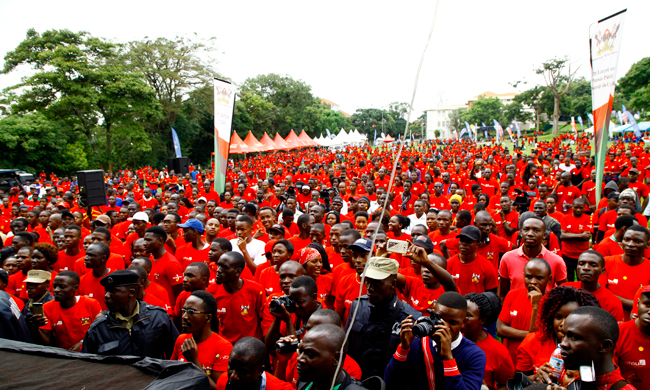On Sunday 14th May 2017, thousands of participants comprising staff, students, alumni, friends and well-wishers assembled in the Freedom Square for the Makerere University Endowment Fund Run, aimed at mobilizing funds for the construction of the Students’ Centre.
The Mak Students’ Centre that will enhance the quality of students’ life and experience is estimated to cost UGX.15 billion. The Chief Runner, Rt. Hon. Rebecca Alitwala Kadaga-the Speaker of the Parliament of the Republic of Uganda, who is an alumnus of Makerere University flagged off the 10km route runners while the Chancellor of Makerere University, Prof. Ezra Suruma flagged off the 5km route runners.
“Makerere University Endowment Fund selected the Students’ Centre as its premier project. The Centre reflects our unwavering commitment to improving the students’ academic experience and the quality of life generated by the conducive environment while at the University. The Students Centre will serve as the collective place that reflects dynamism of the 21st century student in the digital age. It will correct the imbalance in access to socio-cultural amenities that was created by the increase in student numbers,” remarked Dr. Martin Jerome Aliker, Chairperson-Makerere University Endowment Fund (MakEF).
The Students’ Centre will entail a one stop student information centre, state of the Art Auditorium worth 2000 seating capacity and Wall of Fame, Conference facilities, Internet Kiosks, Memorabilia Shop/Bookshop, Recreational/Sports Arena, commercial and shopping centres, as well as entertainment and social areas.
The Vice Chancellor, Prof. John Ddumba-Ssentamu applauded the Board of Trustees of the Makerere University Endowment Fund (MakEF) for initiating the MakRun fundraising drive. He saluted 10km and 5km route runners for participating in the Makerere University Endowment Fund Run (MakRun 2017), a starting point of engagement with the stakeholders to mobilize resources for the Students’ Centre project.
“I am confident that together, we can set up a multipurpose facility for our students. We can demonstrate that what seems impossible to us as individuals can be achieved if we choose to set our hearts and minds to it. No contribution is too small or insignificant,” said the Vice Chancellor.
Fully aware that more financial contributions in form of donations, sponsorships and sale of tickets were still flowing in, Prof. Ddumba-Ssentamu revealed that on the eve of the Makerere University Endowment Fund Run (MakRun 2017), the University had raised UGX.200million from volunteers and well-wishers across the country towards the Students’ Centre Project. The Students’ Centre will be constructed on the Makerere University Main Campus in the open space between the Senate Building and the Lincoln Flats.
The Makerere University Endowment Fund (MakEF) is an entity of Makerere University established in 2014. The Board is tasked with mobilising, receiving and growing the financial resources for the benefit of the University’s current and future generations; enhancing the learning environment in the University; and offering scholarships, research support and innovations.
Chaired by Dr. Martin Jerome Aliker, the Board comprises the following personalities: Ambassador Edith Grace Ssempala, Mr. Barnabas Tumusingize, Mr. Grace Isabirye, Mr. Martin Owiny, Hon. Gerald Karuhanga and Prof. John Ddumba-Ssentamu.
Rt. Hon Rebecca Alitwala Kadaga, who pledged UGX.40million towards the Makerere University Endowment Fund (MakEF) and Students’ Centre Project on behalf of the Parliament of Uganda said the Run was a great milestone for the University and her alumni.
“I learnt that the Run will always be an annual event, so I would like to call upon all Ugandans to be part and contribute towards the University Endowment Fund. When we come together, we can improve the Fund for the good of Makerere University. This will continue to keep Makerere University in the lead not only academically, but through visibility and outreach,” Rt. Hon. Rebecca Kadaga said.
She advocated for transparency and accountability for the funds mobilized, and urged the Makerere University Endowment Fund (MakEF) and the Makerere University Planning and Development Department (PDD) to involve university alumni such as former Kenyan President Mwai Kibaki, and former President of Tanzania, Benjamin Mkapa.
Eng. Dr. Charles Wana-Etyem, the Chairperson of Makerere University Council, also an alumnus of Makerere University commended runners/participants, champions, sponsors, partners for their contribution towards the success of the inaugural Makerere University Endowment Run (MakRun 2017).
“You are all contributors towards this noble cause in various ways. I believe you will come forward to raise money to help in achieving the good causes of the University like the construction of the Students’ Centre. I thank you all for your contribution,” Dr. Wana-Etyem said.
The Chief Runner presented MakRun 2017 medals and certificates to the winners amidst applause from thousands of participants in the Freedom Square. For the 10km race, the winning team comprised Mr. Dick Muhiirwe (Overall), Mr. Mwesigwa David (1st Runner Up) and Mr. Oketch Lazarous (2nd Runner Up). For the 5km race, the winning team comprised Mr. Muhanguzi Oscar (Overall), Mr. Ndibanoha John (1st Runner up) and Mr. Amanya Gilbert (2nd Runner Up).
On behalf of the University Management, the Vice Chancellor applauded the MakRun 2017 Organising Committee chaired by Dr. Florence Nakayiwa-the Director, Planning and Development Department for organising a successful run.
Article by: Ritah Namisango, Mak Public Relations Office
Photos by: Joseph Buwule, LandMark Media Consultancy Limited

 General12 hours ago
General12 hours ago
 General12 hours ago
General12 hours ago
 Humanities & Social Sciences1 week ago
Humanities & Social Sciences1 week ago
 General1 week ago
General1 week ago
 Agriculture & Environment2 weeks ago
Agriculture & Environment2 weeks ago



